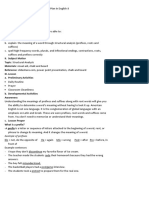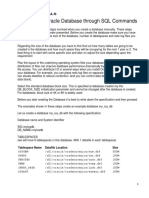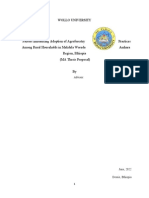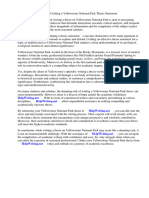Jasmine Lotus Mogra Dahila Phlox Pansy Hibicus: Material Downloaded From - 1 / 6
Jasmine Lotus Mogra Dahila Phlox Pansy Hibicus: Material Downloaded From - 1 / 6
Uploaded by
Omprakash ChandrakarCopyright:
Available Formats
Jasmine Lotus Mogra Dahila Phlox Pansy Hibicus: Material Downloaded From - 1 / 6
Jasmine Lotus Mogra Dahila Phlox Pansy Hibicus: Material Downloaded From - 1 / 6
Uploaded by
Omprakash ChandrakarOriginal Title
Copyright
Available Formats
Share this document
Did you find this document useful?
Is this content inappropriate?
Copyright:
Available Formats
Jasmine Lotus Mogra Dahila Phlox Pansy Hibicus: Material Downloaded From - 1 / 6
Jasmine Lotus Mogra Dahila Phlox Pansy Hibicus: Material Downloaded From - 1 / 6
Uploaded by
Omprakash ChandrakarCopyright:
Available Formats
CBSE
Class 4 English
NCERT Solutions
Chapter – 8
POEM - A WATERING RHYME
1. What is the best time to water the plants?
Ans. Early in the morning and evening are the best times to water the plants.
2. When should we not water the plants?
Ans. We should not water the plants during the mid-day.
3. Which part of the plant should be watered?
Ans. The roots of the plant should be watered.
4. Place letters in their right order to form the names of the flowers.
Ans.
PAETWEES SWEET PEA
MRAIDOLG MARIGOLD
JMINEAS JASMINE
TLOUS LOTUS
ARGOM MOGRA
DHAAIL DAHILA
XOLPH PHLOX
ANSPY PANSY
BISIHCUS HIBICUS
5. Do you have a garden?
Ans. Yes, I have a garden.
Material downloaded from myCBSEguide.com. 1 / 6
6. Name some flowers which grow in your garden or near your house.
Ans. Rose, Marigold, Jasmine, Lotus etc.
7. Give another word for ‘thirsty feet’.
Ans. Roots.
8. What happens when we water plants in the morning? Choose one answer.
(a) They will grow well.
(b) They will dry up.
Ans. They will grow well.
9. From where do flowers get water?
(a) from the bottom (roots)
(b) form the top (leaves)
Ans. From the bottom.
10. Write rhyming words for the words given below.
Ans.
Morning Evening
Car Bar
High Fly
Boots Roots
Heat Beat
where Here
11. Words like morning, evening, watering end in ing. Write six more words to which -
Material downloaded from myCBSEguide.com. 2 / 6
ing can be added at the end to form a new word.
Ans. (a) play + ing = playing
(b) jump + ing = jumping
(c) sing + ing = singing
(d) laugh + ing = laughing
(e) go + ing = going
(f) cook + ing = cooking
12. Look for words in the poem which sound like the words given below:
(a) are (b) there (c) flower (d) where (e) son (f) threw
Ans. (a) are
(b) there – where
(c) flour
(d) where – wear
(e) son – sun
(f) threw – through
13. In the sentences, below the capital letters, commas, full stops and question marks
are missing. Put these in the correct places.
(a) on monday I will go to school
Ans. On Monday, I will go to school.
(b) rahim ravi and raju are going to see the circus
Ans. Rahim, Ravi and Raju are going to see the circus.
Material downloaded from myCBSEguide.com. 3 / 6
(c) sita where are you looking
Ans. Sita, where are you looking?
(d) the tailor went to the market mr singh
Ans. The tailor went to the market, Mr. Singh.
(e) every Sunday I go for a walk have breakfast read story books listen to music and
watch television
Ans. Every Sunday, I go for a walk, have breakfast, read story books, listen to music and
watch television.
(f) laxmi why are you crying
Ans. Laxmi, why are you crying?
(g) oranges mangoes bananas and papayas are fruits
Ans. Oranges, mangoes, bananas and gapayas are fruits.
14. Write a story about a plant that is in danger. Write about how you might help to
save it. Be sure the story has a beginning, a middle, and an end.
Ans. Sarpagandha – An Endangered Plant
Sarpagandha is an important plant. According to Ayurveda, Sarpagandha is the best cure for
blood pressure. From times immemorial, it is used for preparing traditional medicines.
According to the latest details, this plant falls in the category of endangered plants. This also
encourages us to protect the plant, for the well- being of many people. The authorities and
Indian Government has initiated the process of conservation. A coordinated effort need of
the hour.
15. Prepare a speech giving some reasons why it is important to protect flowers and
plants. Include ways that you could help protect endangered plants.
Ans. Speech: Importance of flowers and plants
Material downloaded from myCBSEguide.com. 4 / 6
Plants and flowers are very important to human beings. Here are some of the important
things that plants provide:
Aesthetics: Plants have great “aesthetic” value which means they add to the beauty of the
place.
Medicine: History shows importance to medicine. Eighty percent drugs originate from wild
plants. Two percent of the world’s plants species have never been tested for their medicinal
potential. That means there are many important drugs yet to be discovered.
Food: Although some 3,000 species of plants have been used as food by humans, 90 percent
of the world’s food comes from only 20 plant species.
Industrial Products: Plants are also very important for the industrial goods. Fibres from
plants provide clothing. Some fuel products are made from plants.
Recreation: Plant communities form the basis for many important recreational activities
including hiking, fishing, hunting and natural observation.
Air Quality: The oxygen in the air we breathe comes from the photosynthesis of plants.
Plants can stop the movement of dust and pollutants. Through the intake of carbon dioxide,
plants can also lessen the greenhouse effect caused by the burning of fossil fuels like coal.
Water Quality: Plants are extremely important to the quality of the water we use. A diverse
cover of plants aids in maintaining healthy watersheds, streams and lakes by holding soil in
place, controlling stream flows, and filtering sediments from water.
Erosion Control: The delicate wildflowers that dot the roadsides during the spring, summer
and rainy seasons, protect the soil from erosion caused by heavy rains. Without enough
plant cover, wind or water would erode the thin layer of soil
Climate: Regional climates are impacted by the amount and type of plant cover. Natural
disasters, such as drought, have been blamed on the destruction of forests and other
critically important plant communities.
Wildlife Habitat: Plants provide the necessary habitat for wildlife.
Ecosystem: The word ‘ecosystem’ means the way in which human, plants and animals all
Material downloaded from myCBSEguide.com. 5 / 6
live together supporting each other. Every species serves an important role or purpose to
the community.
Ways in which one can help protect Plants
1. Support: We can help the organisations that protect the endangered plants. We can
become their member, an active volunteer and make financial contribution to their work.
2. Follow Ethical Gardening Practices: If you garden the native plants, don’t transplant
from the wild. Make sure that the plants you purchased have not been collected from forests
but grown.
Material downloaded from myCBSEguide.com. 6 / 6
You might also like
- Simontini Slide - EngDocument21 pagesSimontini Slide - Engsulih primara100% (1)
- Class 4 English Unit-8Document7 pagesClass 4 English Unit-8Saraswati maharanaNo ratings yet
- Types of SentenceDocument16 pagesTypes of SentenceAvila VarshiniNo ratings yet
- The Flowers and Dig The Ground Nicely.: Material Downloaded From - 1 / 2Document2 pagesThe Flowers and Dig The Ground Nicely.: Material Downloaded From - 1 / 2Dibakar PandaNo ratings yet
- I Sem Grammar-1Document13 pagesI Sem Grammar-1abhyuday125No ratings yet
- WorkbookDocument14 pagesWorkbookapi-3147911667% (3)
- Basic Sentence PatternDocument57 pagesBasic Sentence PatternSmarty Town100% (1)
- Accept Any SuitableanswerDocument4 pagesAccept Any Suitableanswergrizzly2010No ratings yet
- English 4: Guided Learning Activity KitDocument19 pagesEnglish 4: Guided Learning Activity KitClervy Joy Villon Dumpit100% (1)
- Teknik Menjawab BIDocument39 pagesTeknik Menjawab BILiz ShehNo ratings yet
- Informal Letter 08Document16 pagesInformal Letter 08Kevin WibisonoNo ratings yet
- Hassan Nouns PracticeDocument5 pagesHassan Nouns PracticeIsaac EscobedoNo ratings yet
- English GrammarDocument6 pagesEnglish Grammarjitender8100% (1)
- WorkbookinschoolDocument14 pagesWorkbookinschoolapi-31479116100% (1)
- G1 English HOLIDAY ASSIGNMENTDocument5 pagesG1 English HOLIDAY ASSIGNMENTrukmaniNo ratings yet
- 1 - The Magic GardenDocument6 pages1 - The Magic GardenDr-Swarnima AgarwalNo ratings yet
- 4 Types of Sentences: Grammar LessonsDocument19 pages4 Types of Sentences: Grammar LessonsMay Hnin WaiNo ratings yet
- G3 Grammar First Term Revision - AnswerkeyDocument4 pagesG3 Grammar First Term Revision - AnswerkeyMohamed ElsisyNo ratings yet
- English Language 014: CONSTRUCTS For Paper 1 (Objectives)Document33 pagesEnglish Language 014: CONSTRUCTS For Paper 1 (Objectives)Si CNo ratings yet
- Group II Prelims General English SyllabusDocument20 pagesGroup II Prelims General English Syllabusrockandroyalskittu3No ratings yet
- Name: Class: Viii Subject: English Date: SESSION: 2023-24Document3 pagesName: Class: Viii Subject: English Date: SESSION: 2023-24monagupta00143No ratings yet
- A.1 FG NounsDocument3 pagesA.1 FG NounsbellarthomsonNo ratings yet
- HomonymsDocument52 pagesHomonymsDexee Giel CanoyNo ratings yet
- Chapter 5-Teaching VocabularyDocument14 pagesChapter 5-Teaching VocabularyPhạm NgọcNo ratings yet
- Proyecto Curso Virtual Basic IDocument9 pagesProyecto Curso Virtual Basic IpilopolloNo ratings yet
- Week 6 Carrot SeedDocument62 pagesWeek 6 Carrot SeedDauntless KarenNo ratings yet
- Nouns For Class 8Document5 pagesNouns For Class 8Adam SaleemNo ratings yet
- Saad QuestionDocument16 pagesSaad QuestionMd A RAZZAKNo ratings yet
- 10th STD SL Englsih Passing Package 2023-24 by Gavi SpoortiDocument51 pages10th STD SL Englsih Passing Package 2023-24 by Gavi Spoortimuniyappam748No ratings yet
- L1 Grammar Fundamentals 1 NAK Whole Book2018Document26 pagesL1 Grammar Fundamentals 1 NAK Whole Book20182355010010No ratings yet
- NCERT Solutions For Class 3 EVS Poonams Day OutDocument7 pagesNCERT Solutions For Class 3 EVS Poonams Day Outsmruti sangitaNo ratings yet
- Enjoy With Gramm.& Comp.-1Document12 pagesEnjoy With Gramm.& Comp.-1RajuMandalNo ratings yet
- LP English 8 PrefixesDocument2 pagesLP English 8 PrefixesCathy TapinitNo ratings yet
- انجليزي مراجعة نهائيةDocument76 pagesانجليزي مراجعة نهائيةhessarashidd11No ratings yet
- Chapter 1 - The SentenceDocument28 pagesChapter 1 - The SentencepraneethNo ratings yet
- Lesson Plan in EnglishDocument7 pagesLesson Plan in EnglishMelanie Ordanel100% (5)
- Have You Ever Been Caught in The Rain? What Will You Do If It Rains and You Have No Umbrella or Raincoat?Document47 pagesHave You Ever Been Caught in The Rain? What Will You Do If It Rains and You Have No Umbrella or Raincoat?Edreah NoNo ratings yet
- Noun For KidsDocument4 pagesNoun For KidsHninn Oo WaiNo ratings yet
- Grade 4 English WorksheetDocument2 pagesGrade 4 English Worksheetarjun454No ratings yet
- WorkbookDocument11 pagesWorkbookapi-31479116No ratings yet
- Assignment-1 BCU 141: Q1 - Online Classes Vs Offline ClassesDocument11 pagesAssignment-1 BCU 141: Q1 - Online Classes Vs Offline ClassesSaloni NeekhraNo ratings yet
- Cl3 Eng Chapter 2Document9 pagesCl3 Eng Chapter 2smruti sangitaNo ratings yet
- Kinds of Words NounsDocument5 pagesKinds of Words Nounselizabethvetania77No ratings yet
- His First Flight: Noun Verb Adjective AdverbDocument39 pagesHis First Flight: Noun Verb Adjective AdverbSrujan ONo ratings yet
- English Reviewer 4 ScaDocument10 pagesEnglish Reviewer 4 ScaEdward AlmazanNo ratings yet
- Nouns: What Is A Noun?Document10 pagesNouns: What Is A Noun?Valensia SumampouwNo ratings yet
- DLP English 5 Day 1Document4 pagesDLP English 5 Day 1Lovely MinaNo ratings yet
- Sim 2017-18 Subject-Verb AgreementDocument31 pagesSim 2017-18 Subject-Verb AgreementTinTin100% (12)
- Teaching Vocabulary: Language, Teaching, Learning StrategyDocument52 pagesTeaching Vocabulary: Language, Teaching, Learning StrategyMiftah MaryanaNo ratings yet
- 3 2nd Term EnglishDocument2 pages3 2nd Term EnglishMuhammad HareesNo ratings yet
- Handsongrammar 5Document31 pagesHandsongrammar 5jamil ahmedNo ratings yet
- The Parts of SpeechDocument31 pagesThe Parts of SpeechUrwa Tul WosqaNo ratings yet
- G10 Important and Less Impostant DetaisDocument26 pagesG10 Important and Less Impostant DetaisaradillaicielveniaNo ratings yet
- English Objective Part FinalDocument4 pagesEnglish Objective Part FinalAllama Nasir AbbasNo ratings yet
- Semester 4 Objective Unit4-6Document18 pagesSemester 4 Objective Unit4-6sonunomore26No ratings yet
- FulunubijejanutevesijajefDocument3 pagesFulunubijejanutevesijajefNaman ChaudharyNo ratings yet
- Class VDocument23 pagesClass VMuhammad AtirNo ratings yet
- Handout N°1 Grammatical Terms Grammar IDocument6 pagesHandout N°1 Grammatical Terms Grammar ICatalina OrellanaNo ratings yet
- English Grammar for Secondary SchoolsFrom EverandEnglish Grammar for Secondary SchoolsRating: 1 out of 5 stars1/5 (1)
- Evaluation Parameter For Mid Term Project ExaminationDocument1 pageEvaluation Parameter For Mid Term Project ExaminationOmprakash ChandrakarNo ratings yet
- Mom Anti Ragging 7 2021-22Document2 pagesMom Anti Ragging 7 2021-22Omprakash ChandrakarNo ratings yet
- Lab - Manual Dbe 2023-24 FinalDocument64 pagesLab - Manual Dbe 2023-24 FinalOmprakash ChandrakarNo ratings yet
- Babu Madhav Institute of Information Technology, UTU: 5 Years Integrated M.Sc. (I.T)Document1 pageBabu Madhav Institute of Information Technology, UTU: 5 Years Integrated M.Sc. (I.T)Omprakash ChandrakarNo ratings yet
- MCQ On TriggersDocument3 pagesMCQ On TriggersOmprakash ChandrakarNo ratings yet
- DBA UNIT 3 Oracle NetDocument50 pagesDBA UNIT 3 Oracle NetOmprakash ChandrakarNo ratings yet
- (I) Ground As Long As Yard (Ii) A Joyful Song (Iii) A Red Cherry (Iv) The Heavy Lead (V) The Fourscore of Eighty (Vi) The Wooden DoorDocument3 pages(I) Ground As Long As Yard (Ii) A Joyful Song (Iii) A Red Cherry (Iv) The Heavy Lead (V) The Fourscore of Eighty (Vi) The Wooden DoorOmprakash ChandrakarNo ratings yet
- What Is Data Science - A Beginner's Guide To Data Science - EdurekaDocument14 pagesWhat Is Data Science - A Beginner's Guide To Data Science - EdurekaOmprakash ChandrakarNo ratings yet
- Register Free: Syllabus Revision 20% Guaranteed Score Doubt Solving NasaDocument11 pagesRegister Free: Syllabus Revision 20% Guaranteed Score Doubt Solving NasaOmprakash ChandrakarNo ratings yet
- Master Theorem - Master Theorem Examples - Gate VidyalayDocument11 pagesMaster Theorem - Master Theorem Examples - Gate VidyalayOmprakash ChandrakarNo ratings yet
- Material Downloaded From - 1 / 3Document3 pagesMaterial Downloaded From - 1 / 3Omprakash ChandrakarNo ratings yet
- Disrespect Own Disown Disable Insecure: Material Downloaded From - 1 / 4Document4 pagesDisrespect Own Disown Disable Insecure: Material Downloaded From - 1 / 4Omprakash ChandrakarNo ratings yet
- Material Downloaded From - 1 / 6Document6 pagesMaterial Downloaded From - 1 / 6Omprakash ChandrakarNo ratings yet
- Material Downloaded From - 1 / 1Document1 pageMaterial Downloaded From - 1 / 1Omprakash ChandrakarNo ratings yet
- Chapter 7 English 1Document7 pagesChapter 7 English 1Omprakash ChandrakarNo ratings yet
- CBSE Class 4 English (FA 1) Set - A Session 2016-17: Material Downloaded From - 1 / 3Document3 pagesCBSE Class 4 English (FA 1) Set - A Session 2016-17: Material Downloaded From - 1 / 3Omprakash ChandrakarNo ratings yet
- CBSE Sample Paper For Class 4 English Er PDFDocument7 pagesCBSE Sample Paper For Class 4 English Er PDFOmprakash Chandrakar100% (3)
- Material Downloaded From - 1 / 6Document6 pagesMaterial Downloaded From - 1 / 6Omprakash ChandrakarNo ratings yet
- (I) Ground As Long As Yard (Ii) A Joyful Song (Iii) A Red Cherry (Iv) The Heavy Lead (V) The Fourscore of Eighty (Vi) The Wooden DoorDocument3 pages(I) Ground As Long As Yard (Ii) A Joyful Song (Iii) A Red Cherry (Iv) The Heavy Lead (V) The Fourscore of Eighty (Vi) The Wooden DoorOmprakash ChandrakarNo ratings yet
- Whenever He Tired He Used To Eat Delicious Apples of The TreeDocument3 pagesWhenever He Tired He Used To Eat Delicious Apples of The TreeOmprakash ChandrakarNo ratings yet
- Shrimad Rajchandra Institute of Management and Computer Application, UTUDocument6 pagesShrimad Rajchandra Institute of Management and Computer Application, UTUOmprakash ChandrakarNo ratings yet
- Mca LP - 060060207Document8 pagesMca LP - 060060207Omprakash ChandrakarNo ratings yet
- DBA PracticalsDocument18 pagesDBA PracticalsOmprakash Chandrakar100% (1)
- Fatuma First Draft ProposalDocument24 pagesFatuma First Draft ProposalAsaye MitikuNo ratings yet
- Rumpon Hidup Dan Hubungannya Dengan Struktur Komunitas Ikan Secara Spasial-Temporal Di Pesisir Kabupaten LuwuDocument13 pagesRumpon Hidup Dan Hubungannya Dengan Struktur Komunitas Ikan Secara Spasial-Temporal Di Pesisir Kabupaten LuwuAbu ZiyadNo ratings yet
- Food PreservationDocument18 pagesFood PreservationNeca Borromeo100% (1)
- Emerging Issues and Challenges of Sustainable Development A National Level ProspectiveDocument9 pagesEmerging Issues and Challenges of Sustainable Development A National Level ProspectiveEditor IJTSRDNo ratings yet
- Mrunal How To Prepare Geography Optional For UPSC MainsDocument9 pagesMrunal How To Prepare Geography Optional For UPSC MainsGauravPriyank TyagiNo ratings yet
- Flora of SeychellesDocument9 pagesFlora of SeychellesSanka78100% (1)
- Term 2 Natural Science SaviaDocument8 pagesTerm 2 Natural Science SaviaMartabm29No ratings yet
- Real-Time Evaluation of NICFI - Indonesia Country ReportDocument170 pagesReal-Time Evaluation of NICFI - Indonesia Country ReportLTSInternationalNo ratings yet
- Eia Process in Mailand TanzaniaDocument16 pagesEia Process in Mailand TanzaniaFred Raphael IlomoNo ratings yet
- Surugiu Et Al. (2021) A Hotspot in The Romanian BlackDocument9 pagesSurugiu Et Al. (2021) A Hotspot in The Romanian BlackVictor SurugiuNo ratings yet
- Urban Landscapes SargoliniDocument193 pagesUrban Landscapes SargoliniJose F. Rivera SuarezNo ratings yet
- Wetlands Assessment in ABA, 2013Document92 pagesWetlands Assessment in ABA, 2013Merga WorkuNo ratings yet
- The Fascinating World of BeekeepingDocument2 pagesThe Fascinating World of BeekeepingGeorge EnacheNo ratings yet
- IBEX Bionomics EPACsDocument8 pagesIBEX Bionomics EPACsIBEX BIONOMICSNo ratings yet
- Environmental Education in The PhilippinesDocument11 pagesEnvironmental Education in The Philippineskrislyn marie layosNo ratings yet
- SOP 3 - ID Packages 1 PDFDocument67 pagesSOP 3 - ID Packages 1 PDFJeff Yong Kian HockNo ratings yet
- HUD Environmental AssessmentDocument58 pagesHUD Environmental AssessmentIndiana Public Media NewsNo ratings yet
- Geography of Natural Resources DevelopmentDocument74 pagesGeography of Natural Resources DevelopmentImmaculate IngabireNo ratings yet
- Yellowstone National Park Thesis StatementDocument8 pagesYellowstone National Park Thesis Statementtrishshearochester100% (2)
- Water PollutionDocument35 pagesWater PollutionTan Sin YiNo ratings yet
- Brick Wall Tiles BTCDocument1 pageBrick Wall Tiles BTCshaky1978No ratings yet
- 22. ĐỀ VIP 22 - Soạn chuẩn cấu trúc minh họa BGD năm 2023 - Môn TIẾNG ANH - Bản word có giải (TN10) -54LmfsKBw-1682675528Document19 pages22. ĐỀ VIP 22 - Soạn chuẩn cấu trúc minh họa BGD năm 2023 - Môn TIẾNG ANH - Bản word có giải (TN10) -54LmfsKBw-1682675528Peter TừNo ratings yet
- Monterey Bay Aquarium Member Magazine Shorelines Fall 2010Document16 pagesMonterey Bay Aquarium Member Magazine Shorelines Fall 2010Monterey Bay AquariumNo ratings yet
- Computational Exercise 3 BANTAYANDocument78 pagesComputational Exercise 3 BANTAYANAriel LunaNo ratings yet
- Biodiversity ConservationDocument15 pagesBiodiversity ConservationArun B VijayNo ratings yet
- Green Days AheadDocument12 pagesGreen Days AheadHarry PineroNo ratings yet
- Sustainable Development IndicatorsDocument78 pagesSustainable Development Indicatorsdigvijay909No ratings yet
- Đề Cương Cuối Kỳ 2 - k11 -HsDocument15 pagesĐề Cương Cuối Kỳ 2 - k11 -HskhangngoakNo ratings yet
- Stage 8 - Worksheets - Chapter 3Document10 pagesStage 8 - Worksheets - Chapter 3poulomiNo ratings yet















































































































